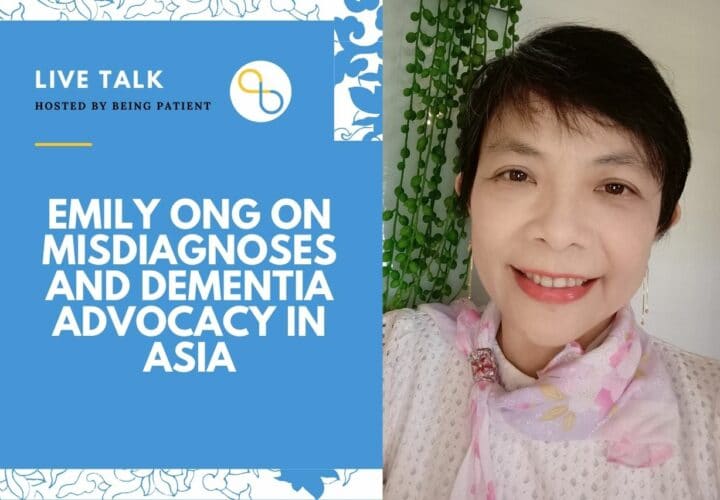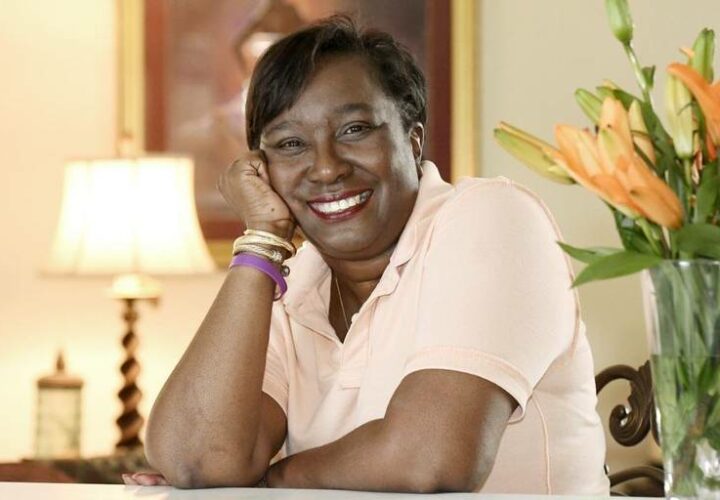Emily Ong, who lives with frontotemporal dementia, shares her vision of forging a more open and compassionate society for those living with dementia.
For Emily Ong, pursuing an accurate diagnosis of dementia has been a difficult and emotional road. In Feb. 2017, she was first misdiagnosed with a rare sleep disorder known as fatal familial insomnia. Months later, she was instead given a diagnosis of Alzheimer’s, which turned out to be a wrong diagnosis as well. Finally, roughly three months after, she was provisionally diagnosed with frontotemporal dementia (FTD) at the age of 51.
The provisional FTD diagnosis was a relief for Ong, but even so, she said navigating this new path was a lonesome journey. Inspired to show others that they are not alone in contending with a dementia diagnosis, she first created the Facebook page Living with Mild Cognitive Impairment & YOD, short for young-onset dementia. Since then, Ong has extended her advocacy work, whether it be by participating in media interviews or joining non-profit organizations like Dementia Alliance International (DAI).
Ong, who lives in Singapore, hopes that her efforts will spur others in Asia to share their own experiences, and to break the stigma of dementia.
In a LiveTalk with Being Patient, Ong, a board member of DAI, shares the challenges that she has faced due to FTD, the barriers of dementia advocacy in Asia, and her hopes for how the medical community can do better in listening to the voices of women living with dementia.
Being Patient: Tell us about your background and your volunteer work as a consultant.
Emily Ong: I was trained in early childhood [education]. Because I [came] across a lot of young children who [had] special needs, but the school [did] not accept them, my whole perspective [changed] and [I] moved my work to children with special needs.
Being Patient: Are you still involved with this work ever since you were diagnosed with FTD?
Emily Ong: Not for one-to-one [assistance with children]. Because of my cognitive changes, I have confusion of the fine details of the different types of special needs. But I’m still able to give a global perspective in intervention and things like that. Occasionally, I still have [schools] in Singapore that invite me to provide support for teachers and parents who have children with special educational needs in mainstream [schools].
Being Patient: That must be a great way for you to continue doing what you’re passionate about.
Emily Ong: To be able to continue to contribute in my own small way with whatever that is left in me is very beautiful.
The most beautiful part is that the school and the parents know that I have dementia. They still respect me and work together with me … and don’t feel like my work is not important because [I] have dementia. That puts me in a position whereby I feel that I’m still of value and still respected for my expertise.
On Ong’s misdiagnoses and FTD symptoms:
Being Patient: What were some of the early symptoms of FTD that you began to experience, and how do these symptoms affect your daily life?
Emily Ong: The first thing I noticed [was] the significant decline in my executive functioning, like planning. Whenever my family [goes] for a holiday trip, whether it’s within our own country in Malaysia – I come from Malaysia – or overseas, I’m the one [doing] detailed planning: where to stay, where to eat, places to go, things like that. But now, I’m no longer able to do that …
I take so much time to organize things, and multitasking is definitely not a thing that I can do. [The] most I can do [is] two tasks at one time, but the chance of getting one of the tasks with more mistakes is very high, compared to [focusing] on one.
I cannot handle group conversations. If there are more than two people and they come with more than two topics, I will be totally off. I will be sitting there very [quietly].
These are the changes that I start to find in myself. But the problem is that unlike memory, [these changes are] not noticeable [to] people … I put in so much effort, for example, [for] this interview with you. You won’t be able to see the hours that I put in on my notes to prepare for this. But what people see is just the end product, and the conclusion is that, ‘Emily, you’re still okay. You’re still super, super efficient.’ Getting the doctor to accept that there [are] changes to my cognition is very tough.
Being Patient: Tell us about the first time you saw a neurologist, and the subsequent misdiagnoses you received.
Emily Ong: The first time I [saw] the neurologist was in 2017 … because I was having [a] sleeping problem. Thyroid [can] give you [a] sleeping issue, but my thyroid situation had [recovered] already, and I still [had] this sleeping issue. That [was when] I was referred to see a neurologist … After doing the PET scan … the neurologist together with the radiologist felt that I [had] fatal familial insomnia, FFI. So I was told that my cognition would degenerate. Because it’s fatal, I was given a very short time to prepare my life.
But surprisingly, looking back, during that time, I also [did] MoCA (Montreal Cognitive Assessment) tests and things like that. The results [kept] on dropping … There [was] no mention of cognitive impairment or possibility of dementia, but instead, I was treated for FFI and was on benzodiazapine for a few months. That was such a heavy drug and [did] nothing for me … My whole family also felt that it [was] a wrong diagnosis.
We didn’t want to go back to see the doctor … [another] doctor said that he [was] very confident I [had] young-onset Alzheimer’s. So I was on Exelon Patch. Unfortunately, the lumbar puncture and brain scan showed that I [didn’t] have Alzheimer’s. That was another blow to me. Another misdiagnosis … After that, they [started] to observe me again. Then, they put me on [a] provisional [diagnosis of] frontotemporal dementia.
Being Patient: How did you feel about the FTD diagnosis?
Emily Ong: FTD is [a] more correct description of what I’m going through. But the doctor felt that the FTD is more of a behavioral variant rather than language. But for me, as a person [with] first-hand experience of the changes, I felt that changes in my behavior is less [of an issue]. I only have certain social rules that I am no longer aware of, like [the rules of] a queue. I found that I have declined a lot in my language. But the doctors [don’t] feel that I have a language issue.
Being Patient: You are passionate about advocating for a gender-based approach to diagnosing and treating dementia. Tell us more about your thoughts about this topic.
Emily Ong: The advocacy of women and dementia is a very key focus for us at Dementia Alliance International. That is an organization by and for people living with dementia. We know that globally more women than men are affected by dementia … The gender-based diagnosis is very overlooked. I want researchers or medical professionals to really understand that dementia is complex and is unlike diabetes, which you can quantify on the blood test. There is a need to work together with the patient to have a more accurate diagnosis, so that women will have an early diagnosis and the necessary intervention.
Also, for women like me, we spend most of our time as a homemaker. I’m involved in voluntary work that doesn’t have performance appraisal, so any change in my cognition will not be reflected, unlike men who normally will have jobs that have performance appraisal.
These are the things that the researcher and the medical professional need to take into consideration.
On breaking the stigma of dementia in Asia:
Being Patient: Do you think that a dementia diagnosis is quite stigmatizing for women living in Asia?
Emily Ong: Especially in Asia, [there’s the culture of] ‘seen but not heard’ [for women]. If you are a woman and you are living [with dementia], it’s a double blow of a stigma.
When I was diagnosed with dementia, I set up a facebook page Living with Mild Cognitive Impairment & YOD. My aim is to get people to talk and normalize that conversation about dementia, and that you should not feel afraid. You should not feel ashamed that you have dementia. It should be [seen] just like any other medical condition.
Of course, the stigma is still very high. If you look around Asia, the number of dementia advocates is comparatively less to European countries. But things are changing.
“I’m very happy that there are more and more people,
even women who are living with dementia —
young people like me — who are also stepping up
and sharing in Chinese. I feel that that is very
worthwhile for all the sacrifices that I make.”
I find that the biggest obstacle of why there are less dementia [advocates in Asia] is not purely that they don’t get to step up. It’s [also] because of the stigma attached to dementia [in] which the family would [not] reveal it to other people.
Also, [people] don’t want to seek out medical help. [They are] declining so much that … very soon [they] are no longer able to [function] at the level that they can have a conversation.
Being Patient: How does your family feel about your advocacy work?
Emily Ong: My family is very supportive. I’m always very protective of them. I know that the stigma is very high. So whenever I go out for my advocacy, I never disclose the fine details of my family members. I don’t want people to walk up to my husband and say, ‘Hey, how’s your wife?,” when I go out with him. That will make him feel very hurt.
I feel that it is not the right time yet to reveal my family members to the public, [not] until the day when society is able to have a conversation about dementia, like we can talk about cancer without that stigma for the family.
Being Patient: What are your main motivations for being a dementia advocate?
Emily Ong: When I was diagnosed in 2017, there was no one to work together with me. I thought that no one who [receives] a diagnosis of dementia should walk the journey by themselves. I decided that I will take that step to show that, ‘Okay, I’m living with dementia. Yes, I’m in the [Asian] culture here. Let me do it … and hopefully, it will create a ripple effect and other people who see me stepping up will also do so.’
“I want my friends who are living with dementia
in other parts of Asia to have the bravery to step up,
just like our counterparts in European countries.”
To be very frank, I’m very happy that there are more and more people, even women who are living with dementia — young people like me — who are also stepping up and sharing in Chinese. I feel that that is very worthwhile for all the sacrifices that I make.
Ever since I stepped up, I have [received] good, encouraging support from people. At the same time, I’m heavily criticized by people, because based on what they see — that I can talk like this with you — they say that I don’t have dementia, and I’m using dementia as leverage to get myself into the public eye. I do receive comments that [are] very harsh. But I feel that everyone has the right to have an opinion. It’s very sad that there are people who are not well educated and don’t have that knowledge. It makes me work even harder.
Whenever I do this kind of global interview, it’s my very wish that someone in Asia who is living with dementia will actually step up and talk about it. That is a strong motivator for me. I want my friends who are living with dementia in other parts of Asia to have the bravery to step up, just like [our] counterparts in European [countries]. That’s the only way we can reduce the stigma and discrimination: to have people who [are] living with dementia to share, to openly talk about it.
The interview has been edited for length and clarity.
Contact Nicholas Chan at nicholas@beingpatient.com



